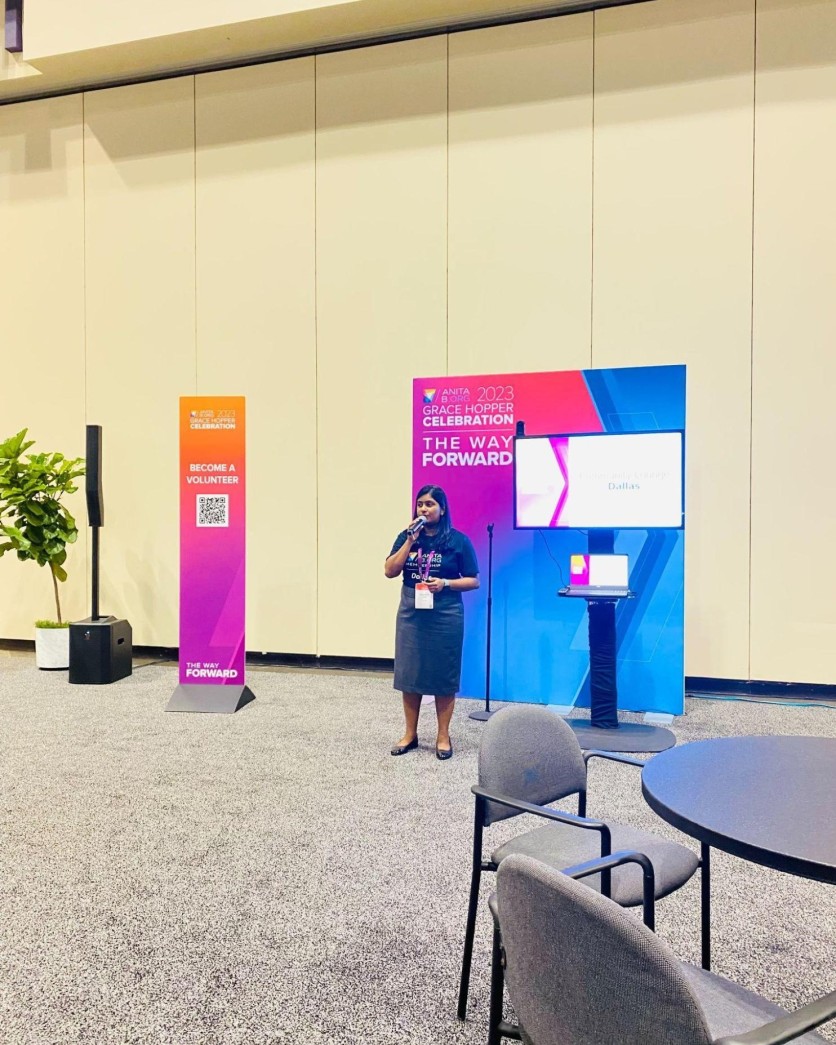
When an organization's systems can't keep up with user demand, it can result in costly problems—online stores crash during peak sales events, payment systems stall, and customer service queues overflow with complaints. Businesses lose revenue as frustrated users abandon their carts or switch to competitors, and the reputational damage can be even harder to repair.
But scalability doesn't have to be a breaking point. Dona Maria Jose, senior software engineer at Slack, offers practical strategies that can help organizations scale without compromising performance or user experience.
From Indian Student to Senior Slack Engineer
Dona's passion for technology and problem-solving started during a 6th-grade summer programming class. This foundational experience sparked an interest that propelled her to an undergraduate degree in computer science at a school in India. It's also what guided her choice to move to the United States to pursue a master's in computer science from the University of Texas at Arlington. There, she was recruited by Visa as a senior software engineer.
At Visa, Dona worked in financial technology, improving the tools and workflows that software developers use to write, test, and maintain code. However, she soon moved on to Microsoft, where she built new systems from the ground up and led efforts in GDPR compliance to help protect user data. Afterward, she transitioned to Dropbox, where she built core software features and spearheaded new projects. Now, she works as a senior software engineer at Slack, focusing on building and refining products.
Over nearly a decade in tech, Dona has tackled a wide range of challenges, but creating scalable systems has consistently remained her main passion. "The ability to design systems that not only function well at a small scale but can also grow seamlessly as usage expands is crucial in today's fast-paced tech environment," she explains.
Beyond preventing critical failures, scalability saves companies money by allowing them to adjust their resources as needed—scaling up during busy times and down when things are quieter. For new businesses, scalability helps them take on more users, handle bigger data loads, and roll out new features without overwhelming their existing servers or development teams.
Dona Maria sees scalability as building systems that work not just today but for whatever challenges or opportunities come tomorrow.
A Zero-to-One Initiative at Microsoft
One of the most notable examples of how Dona has built for scalability is her work at Microsoft, where she played a pivotal role in a zero-to-one initiative—creating a system entirely from scratch without relying on pre-existing frameworks.
There, she developed a React-based dashboard, a single-page application that would show user-specific metrics—data customized for individual customers or groups using the system. The goal was to take complicated data and present it in a way that was clear and actionable so that leadership could make better decisions quickly.
She also took the lead in making sure the team stayed compliant with GDPR (Europe's strict data privacy laws), designing a tool that could detect and manage potential leaks of personally identifiable information.
However, her most crucial work was making sure the platform would scale in accordance with usage. This required designing a forward-thinking architecture and collaborating with cross-functional teams, ensuring a system that was capable of growing along with the user base.
Scaling File Organization at Dropbox
At Dropbox, Dona took on the challenge of improving the cloud storage provider's multi-file organize feature, a tool designed to streamline how users manage their files. She spearheaded the development of custom filters and automationworkflows to make file management more efficient and intuitive. By integrating rule-based organization features, she made sure the multi-file organize feature could meet a wide range of organizational needs, from small personal projects to large-scale business operations.
Dona also designed a user-friendly interface with visual aids and illustrations, helping users easily understand the new tools. To ensure a smooth release, she introduced bug-bash sessions early in the development process. These quick, focused meetings allowed the team to catch and fix issues before they could pile up, preventing small bugs from growing into larger problems that would slow down future development.
Her goal of scalability paid off in a big way: Automation workflows now account for 83% of files organized weekly, and the feature as a whole saw a 712% increase in files automatically sorted and labeled using file organization features. This success not only saved users time but also set a new standard for efficiency and ease of use at Dropbox.
Inspiring the Next Generation of Scalable Systems
Dona Maria Jose is passionate about designing and building scalable systems that empower businesses and users alike. With over a decade of experience as a senior software engineer, she's contributed to major projects at companies like Visa, Microsoft, Dropbox, and Slack. Her expertise lies in developing high-performance, user-centric products and creating systems that are not only efficient but also adaptable to future demands.

With achievements like winning the Claro Silver Award for Technology and serving as a mentor and judge for prestigious tech competitions like NASA Techstars, Dona has cemented a reputation as a leader in scalable system design. Beyond her technical contributions, she's a dedicated mentor, actively fostering growth and diversity in the tech industry by guiding aspiring professionals and advocating for inclusive communities. Through her mentoring and speaking engagements, she's helping the next generation of engineers embrace best practices for creating systems that aren't just built to last—they're built to grow.
ⓒ 2025 TECHTIMES.com All rights reserved. Do not reproduce without permission.





